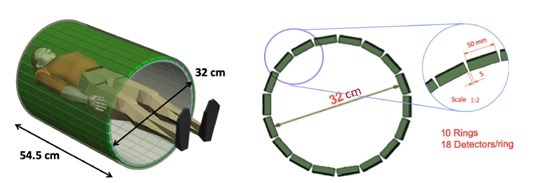Research
Phoenix System
Phoenix System
Andrea González-Montoro leads a Starting Grant project of the European Research Council (ERC) at this Institute. This grant involves 1.5 million euros of funding over the next five years. This economic contribution is part of the European Union’s Horizon Europe program.
A scanner for pediatric patients
Positron emission tomography (PET) devices make it possible to obtain molecular images of organs and metabolic processes in the human body through the use of radiopharmaceuticals. These devices are used to monitor diseases such as leukemias, neuroblastomas and lymphomas, among others. However, the latest generation PET scanners are not optimized for pediatric patients, as they do not allow full body images to be obtained, their spatial resolution prevents small images and, in addition, they are not optimized in terms of sensitivity, imposing the injection of high doses of the radiopharmaceuticals necessary to obtain the medical image. This is especially critical for children, who are more sensitive to the effects of radiation than adults. These limitations compromise the diagnostic quality and, therefore, the prognosis of pediatric patients.
To overcome these limitations, which compromise the diagnosis and prognosis of pediatric patients, Andrea Gonzalez-Montoro proposes to develop a novel high-performance PET scanner that is adapted to pediatric requirements. The Phoenix system will achieve 30 times the sensitivity of current PET scans, provide a resolution of less than 3 mm, and have a length of 70 cm to cover all the organs of the child. The PHOENIX scanner detectors will be based on a novel design combining BGO-type crystals, silicon detectors and signal reading electronics, not available to date, that will allow discrimination of ultrafast Cherenkov radiation produced in scintillators.
The successful construction of the Phoenix equipment will represent a technological breakthrough with a consequent improvement in the diagnosis and prognosis of numerous childhood diseases.


